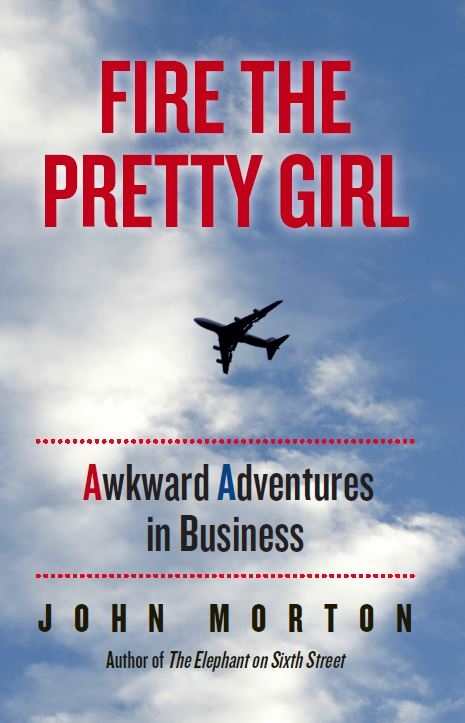
Fire the Pretty Girl
Awkward Adventures in Business
- 2014 INDIES Finalist
- Finalist, Business & Economics (Adult Nonfiction)
Young professionals will find insight in this look at how humility can aid in a businessperson’s career growth.
Dedicated to “the hot intern” and opening with the line, “If she weren’t so pretty, I wouldn’t have fired her,” John Morton’s collection of autobiographical essays is far more entertaining and self-reflective than this misogynistic opening suggests. With dry wit and self-effacing honesty, Fire The Pretty Girl follows the author’s clumsy, fake-it-till-you-make-it journey from the hospitality industry to business school, and then to eventual success as a speechwriter for, and trusted confidant to, the movers and shakers in the corporate world.
The book’s material will feel familiar to anyone who has fumbled his or her way through young adulthood with “high energy and low self-esteem,” making a living in service sector jobs but yearning for more, navigating interpersonal relationships and complex power dynamics awkwardly but earnestly. Working for “semi-literate” bosses, trying to reconcile his liberal values with the more conservative rewards of corporate life, and earning promotions that seem to baffle him, Morton never lets readers forget how very accidental his success felt to him along the way. His humility is endearing and often quite funny. In an era of brash memoirs and self-help tomes touting confidence above all, this volume offers a refreshing kind of narrative.
Morton’s prose is skillfully executed, concise, and sharp. The writing is so entertaining that even those who aren’t drawn to reading about the business world will be engaged throughout. Where more egotistical narrators might take pride in finding that the words they’ve authored are so inspirational that they ended up on a motivational poster, Morton asserts that he plagiarized part of his eight “Resolutions for the Year 2000” from Bruce Springsteen and Winston Churchill, and stopped at eight resolutions because he ran out of ideas. Despite the evidence that Morton was exceedingly successful in his field, at the book’s heart is deep humility.
If the text has a failing, it is that Morton seldom acknowledges or examines the privilege that allows him to propel ahead in his career without a glance backward. Given his social stature, it is not remarkable that Morton moved up in the business world—but that is not what this book is about. Rather, its contribution to the genre of business memoir is far more about Morton’s willingness to be honest about his failures, his missteps, and the times when he felt fraudulent, expressing a deep sense of self-doubt which so many can relate to. These are admissions we may catch glimpses of in many retrospective works written by career executives and public figures, but rarely are they the point of a book.
In this way, Fire The Pretty Girl is entirely unique and engrossing. Young professionals in particular, beginning blundering journeys along their unmapped career paths, will devour it.
Reviewed by
Sarah Stewart
Disclosure: This article is not an endorsement, but a review. The publisher of this book provided free copies of the book and paid a small fee to have their book reviewed by a professional reviewer. Foreword Reviews and Clarion Reviews make no guarantee that the publisher will receive a positive review. Foreword Magazine, Inc. is disclosing this in accordance with the Federal Trade Commission’s 16 CFR, Part 255.
